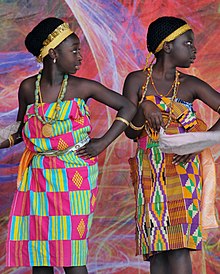
Back أشانتي Arabic Aşanti (xalq) AZ Ашанти Bulgarian Aixanti Catalan Ašantové Czech Ashanti Danish Aschanti (Volk) German Aŝantioj EO Pueblo asante Spanish Ashanti (etnia) EU
Asantefoɔ | |
|---|---|
 | |
 Akan dancers in Ghana | |
| Regions with significant populations | |
| Asante Region ( | |
| Languages | |
| Religion | |
| Related ethnic groups | |
| Akan (Agona, Akuapem, Akwamu, Akyem, Bono, Coromantee, Fante, Kwahu, Wassa, Sefwi) |
The Asante, also known as Ashanti in English (/əˈʃɑːntiː/ ⓘ), are part of the Akan ethnic group and are native to the Ashanti Region of modern-day Ghana. Asantes are the last group to emerge out of the various Akan civilisations. Twi is spoken by over nine million Asante people as their native language.[1][2][3]
The Asante people developed the Ashanti Empire, along the Lake Volta and Gulf of Guinea.[4] The empire was founded in 1670, and the capital Kumase was founded in 1680 by Asantehene Osei Kofi Tutu I on the advice of Okomfo Anokye, his premier.[4] Sited at the crossroads of the Trans-Saharan trade, Kumase's strategic location contributed significantly to its growth.[5] Over the duration of the Kumase metropolis' existence, a number of peculiar factors have combined to transform the Kumase metropolis into a financial centre and political capital.[5] The main causal factors included the unquestioning loyalty to the Asante rulers and the Kumase metropolis' growing wealth, derived in part from the capital's lucrative domestic-trade in items such as gold, slaves, and bullion.[5]
- ^ Cite error: The named reference
Asante-Asante Twiwas invoked but never defined (see the help page). - ^ "Asante » Asante Twi". ofm-tv.com. Archived from the original on 2017-04-30. Retrieved 2015-08-01.
- ^ Sheard, K. M. (2011). Ashanti Warlike Meaning (Llewellyn's Complete Book of Names for Pagans, Wiccans, Witches, Druids). Llewellyn Worldwide. ISBN 9780738723686.
- ^ a b "United Asante States Under Nana Osei Tutu I". asantekingdom.org. Archived from the original on 2015-08-11. Retrieved 2015-08-01.
- ^ a b c "History Of The Asante Confederay » Restoration Of The Asante". asantekingdom.org. Archived from the original on 2015-09-23. Retrieved 2015-08-01.